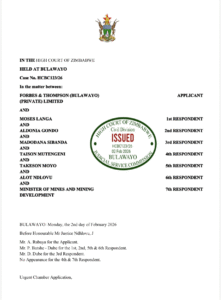A PRESIDENTIAL ADVISORY COUNCIL IS NOT WHAT ZIMBABWE NEEDS
The Zimbabwean government, in a bid to foster economic growth and address the myriad of challenges faced by the nation, formed a Presidential Advisory Council (PAC) in 2019. While the move appeared to be well-intentioned, it has become increasingly evident that the PAC is not what Zimbabwe needs. In a nation grappling with a collapsing economy, rampant corruption, and a lack of basic social services, the PAC has done little to improve the situation. It is time to re-evaluate the necessity and effectiveness of such a council and explore alternative solutions that can provide tangible benefits to the Zimbabwean people.

To begin with, the PAC’s composition raises serious concerns about its ability to effectively advise the president. The council consists of a mixture of business leaders, academics, and social leaders, but the majority of its members are drawn from the private sector. This bias towards the corporate world has led to a skewed focus on economic policies that primarily benefit large businesses, while sidelining the needs of everyday Zimbabweans. Moreover, the lack of transparency in the selection process has also raised questions about the council’s legitimacy and the motivations behind its formation.
Additionally, the PAC’s limited scope of influence further undermines its effectiveness. The council only has an advisory role and does not possess any decision-making authority. This means that the president is under no obligation to implement its recommendations, and the council cannot hold the government accountable for its actions. Consequently, the PAC risks becoming a mere rubber stamp for the president’s policies, without any real power to effect change.
The opacity surrounding the PAC’s operations also casts doubt on its ability to positively impact the country. Since its inception, the council has held meetings behind closed doors, with no public access to its discussions or decisions. This lack of transparency fuels suspicions that the PAC may be yet another avenue for the enrichment of a select few, rather than a genuine effort to address the needs of the Zimbabwean people. To build trust and promote accountability, any advisory body must operate transparently and openly engage with the public.
Furthermore, the establishment of the PAC distracts from the urgent need for institutional reforms in Zimbabwe. The council’s formation may give the impression that the government is taking steps to address the country’s challenges, but it does little to address the underlying issues that plague Zimbabwean society. In order to achieve meaningful change, the government must focus on strengthening the rule of law, addressing corruption, and reforming key institutions such as the judiciary and the police force. The PAC, as it currently operates, does not contribute to these essential reforms.
Instead of relying on a Presidential Advisory Council, the Zimbabwean government should consider alternative solutions that have a greater potential to improve the lives of its citizens. For example, investing in education, healthcare, and infrastructure would create a more stable environment in which the economy can flourish. Additionally, the government should explore avenues for collaboration with civil society, local communities, and international partners to jointly develop and implement strategies to tackle the nation’s most pressing issues.
In conclusion, while the formation of the Presidential Advisory Council may have initially seemed like a promising step towards addressing Zimbabwe’s challenges, it has proven to be an ineffective and unnecessary entity. Rather than continuing to pour resources into the PAC, the government must focus on implementing meaningful institutional reforms and developing policies that prioritise the needs of the Zimbabwean people. By doing so, Zimbabwe can begin to rebuild trust in its institutions and lay the foundation for a brighter future.





